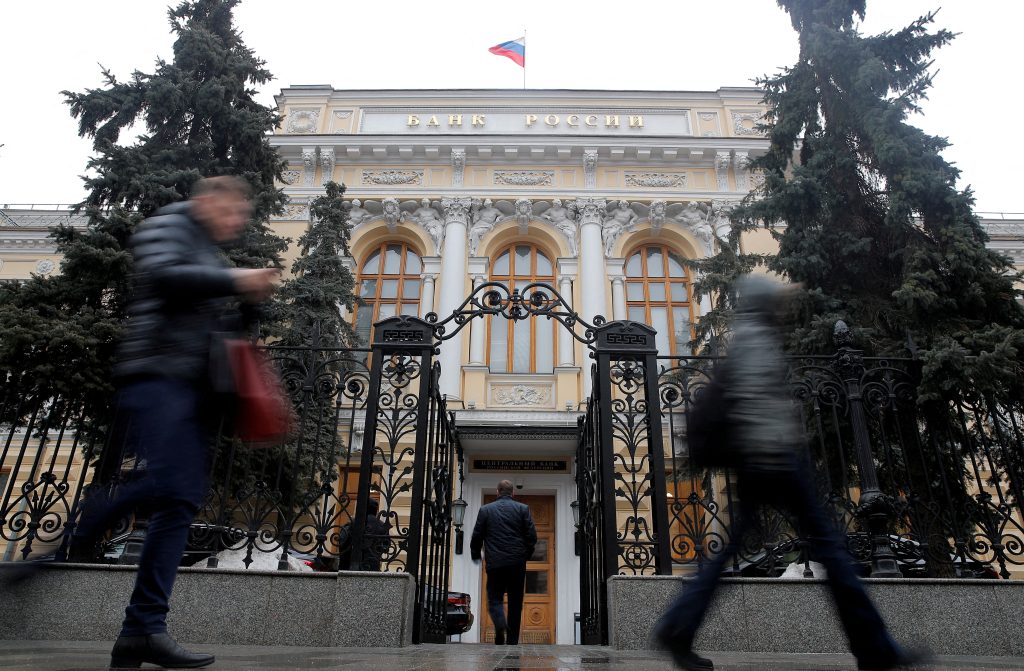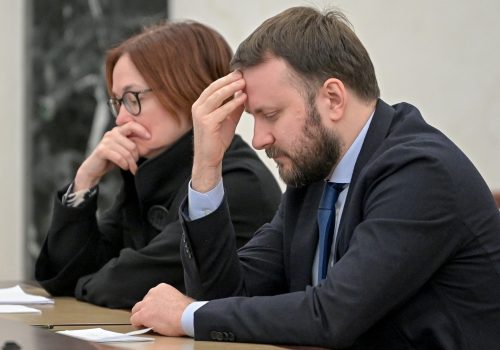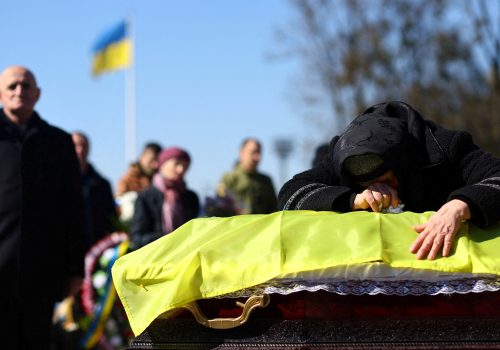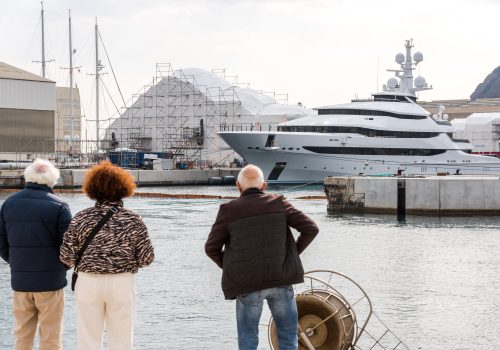The West’s unprecedented sanctions against Moscow over its invasion of Ukraine are expected to shrink the Russian economy by up to 15 percent this year. However, the Kremlin’s response so far suggests that Russia still has tools at its disposal to help it defend against a total economic meltdown, unless its energy export revenue tap is turned off.
Consider what has happened so far: Western sanctions have frozen more than half of the Central Bank of Russia’s (CBR’s) reserves. The CBR has had to enforce capital controls and mandate the conversion of 80 percent of export revenue into rubles, but this has so far allowed it to supply banks with sufficient liquidity to meet their liabilities.
Then last week, the Kremlin announced that “unfriendly”—meaning sanctions-wielding—countries will now be required to settle energy exports in rubles. Markets rightly judged that the move increases demand for spare rubles, and the Russian currency has already recovered some of the value it has lost in recent months. Over the coming weeks, Russia will now ensure that all 100 percent of export revenue is forcibly converted into rubles. Ruble payments can only feasibly be made in Russia, so the decision also makes it harder for exporters to avoid this conversion by accepting payments into escrow accounts held abroad.
There is an irony to the new policy which Russian President Vladimir Putin will enjoy. Western companies must now go to the Moscow exchange or the CBR—the very institution that has been sanctioned—and hope that it will accept their money. Clearly, Russia needs this income and won’t turn them away, but in the mind games that powers play against each other, turning the tables even symbolically is something.
Still, it is important not to exaggerate the implications of Russia’s response to the sanctions. A stronger ruble will help slow inflation but makes it more difficult for the Russian government to run a surplus as its oil and gas income will convert less favorably into the currency used for domestic and military spending. Contrary to suggestions from some economic commentators inside Russia, the move will not force the Europeans to lift sanctions on the CBR. European governments can simply clarify that their energy company subsidiaries in Russia can buy rubles from the CBR or on the Moscow exchange.
The fact that such accommodations are likely shows that US President Joe Biden’s claim last weekend that the ruble has been “reduced to rubble” was an exaggeration, and that such an outcome may be beyond the reach of Western consensus. Asset prices have risen since the CBR cautiously reopened markets last week. After some equivocation, the Russian Ministry of Finance has made interest payments on time and in dollars. The ruble is now just 26 percent below its pre-invasion value to the dollar, having plummeted well over 50 percent in early March. Overall, Russia’s financial system has stabilized, even though it is in a weaker position than it was before the sanctions.
The medium-to-long-term outlooks for the country’s economy remain gloomy. Russia is isolated and unable to source important components for the economy to operate normally. Substitution policies aren’t credible outside the agriculture and food sectors, and non-Western investors will be spooked by the threat of secondary sanctions.
Putin’s decision to keep Governor Elvira Nabiullina at the helm of the CBR for another five years should be seen in this context. We now know she tried to resign, but Putin needs a veneer of financial respectability for the “re-orientation” of the Russian economy to have any credibility at all. This objective doesn’t provide a guarantee against a sovereign default in the future. The principal and interest payments due in April are much larger than what Russia paid in March. The license from the Office of Foreign Assets Control that allowed US-based Citi to process Russia’s March interest payments is also due to run out on May 25, meaning Russia could be completely cut off from US banks by June.
Still, as bombs continue to fall on Ukraine, the key short-term question is export income. While it isn’t a game-changer, the Kremlin’s ruble payment ploy shows that Moscow will continue to have economic trump cards unless the westward flow of natural resources is severely curtailed, and faster than the European year-end reduction target would dictate. Combined with the stronger ruble, a more comprehensive embargo from Europe would threaten Russia’s current account surplus—suddenly making it more difficult to pay public-sector salaries and wage war.
Charles Lichfield is the deputy director of the Atlantic Council’s GeoEconomics Center.
Further reading
Fri, Mar 4, 2022
The Russian Central Bank is running out of options
New Atlanticist By Charles Lichfield
The now-embattled institution didn't expect to be sanctioned so quickly—and was forced to prepare its response in a hurry.
Sun, Mar 27, 2022
Russian energy embargo: Europe must stop financing Putin’s Ukraine war
UkraineAlert By Diane Francis
Naftogaz CEO Yuriy Vitrenko has accused European countries of funding Vladimir Putin's invasion of Ukraine and called for an immediate embargo on all Russian energy exports in order to stop the war.
Wed, Mar 9, 2022
What’s left to sanction in Russia? Wallets, stocks, and foreign investments.
New Atlanticist By Brian O’Toole, Daniel Fried
There are still some tools left for the West to escalate sanctions against Russia in response to its aggression against Ukraine—including an Iran-style approach.
Image: People walk past the Central Bank headquarters in Moscow, Russia on February 11, 2019. (Photo by Maxim Shemetov/Reuters)



